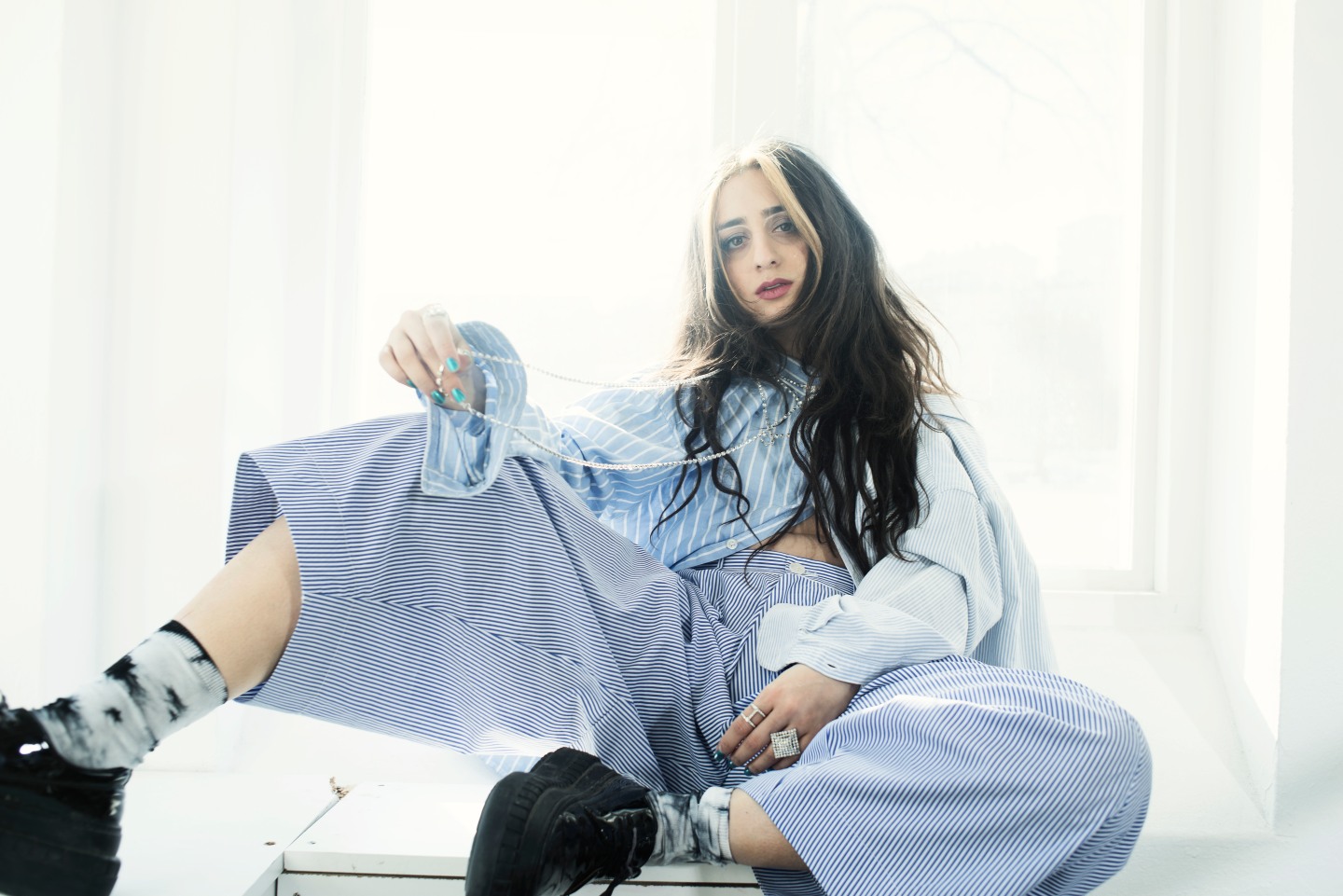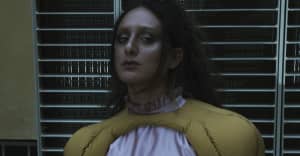Nadia Tehran Is The Swedish-Iranian Artist Demanding A Voice For Outsiders Everywhere
The fearless electronic pop singer explains why all art — even a love song — is political.
 Nadia Tehran
Duo Blau
Nadia Tehran
Duo Blau
Nadia Tehran was brought up in two different cultures. As a child, she lived in a small Christian town named Jönköping in southern Sweden, and was raised by Muslim Iranian parents. She watched American TV and visited her cousins in Iran. Punk and rap music turned her ear, but she also listened closely to her father’s stories from the front line of the Iran-Iraq War. And for the past two years, she’s drawn from the richness of these cultures to forge a musical identity that’s purely her own, most decisively shown on last year’s blistering synth-punk EP Life Is Cheap, Death Is Free.
Even so, her artistic confidence has come at a price — and thanks to her 2016 video “Refugee,” Tehran doesn’t think she’ll be welcome back in Iran. The video shows the 26-year-old artist wearing a headscarf and standing atop a multi-storey building in Iran, roaring lyrics like I'm a beauty and a beast/ A disease from Middle East over distorted Arabic aerophones and off-kilter beats. She playfully flexes for the camera with a posse of friends, while police patrol the streets. In a phone call this spring, Tehran remembered that her actions while filming the video last year were “way past illegal.” She was frequently stopped, at one point arrested, and was left unsettled by the realities of a country she thought she knew.
When we spoke, her plans to move from Sweden to America had been derailed in the light of Trump’s Muslim Ban, but she was determined to not let racist regimes get the better of her. “I don't want to waste my breath talking about a psychotic person who's ruining the world,” she says, “and trying to tell me that I'm less worthy just because of my ethnicity. I almost want my album to be about everything else [other] than that.”
Tehran’s debut album is due out later this year, with producer credits from the likes of Jam City, Gud, and Yung Sherman (the latter two are on the same label as Tehran, the Stockholm-based YEAR0001). Tracks recorded so far showcase a patchwork of sounds and genres, stitched together with traditional Iranian samples, and play off brazen brassiness with moments of stark vulnerability. But before that, she’ll release a video for 2016 track “Cash Flow” video in three different segments — the first of which, a Lord Of The Flies-inspired forest scene, The FADER is premiering today. She sat down with The FADER over Skype to talk identity, social injustice, and how she learned to find strength in emotional honesty.
How did you want the “Cash Flow” video to reflect the song’s themes?
The song talks about disconnection to society based on class, gender, and race, and the constant “fight or flight” battle. But there is a strength in being outsiders together, a community owning our positions. I directed my previous videos myself, but this time I did all the creative direction, design, and styling. In “Part 1” we made almost all the clothing ourselves — the concept is about taking clothes that traditionally belong to "the power" and making them our own, combining them with trash and nature; which in 2017 in many ways have become the same thing.
While we were filming in the darkest part of Stockholm’s woods, there was a terrorist attack going on in the city. Everyone in the video was my closest friends and family, and we were all gathered while hearing about it. We knew what was going on, but we couldn't lose focus of what we were trying to create. It all became so poetic, because the message of the video is to stand strong together outside the fucked up system of society and create your own space. We were tested on that exact thing as we were making it.
What do you think is the role of artists in protesting social injustices?
First of all, I think that all art is political, whether you choose to speak about something or choose to ignore it. The most important thing for me is that when artists speak on political issues, it comes from a genuine place and it comes from knowledge. If you speak on an issue, then read a book about it before, or make a real analysis. Don't just wear a shirt that says, “I'm a feminist.” I think that goes for everyone, it's not for artists only.
I liked what you said in another interview, "It's important for girls who look like me to be able to just sing a love song."
Yeah, exactly. That's kind of what I'm exploring with my album too. Growing up, I've always been forced to be this tough girl with a really hard approach, and I've been screaming and making punk music and nobody could hurt me...You build up this defense. But I realized lately that actually the biggest privilege you can have is to be vulnerable. Maybe that's when you're the strongest. Would a girl like me matter if I were to just sing a love song? Would I still matter in today's musical landscape? Or do I have to be loud and screaming to be heard?
 Nadia Tehran
Duo Blau
Nadia Tehran
Duo Blau
Your new album’s opening track, which is in Farsi, seems like its most vulnerable. There’s a man’s speaking voice at the start — where’s that from?
That's my father's voice. My dad was in the war, and he was a soldier at the front line for two years. He had done his two years [of service], had collected all his things and was about to leave — then there was this attack, and he got this order to make his men drive this car with ammunition to the front line. Everyone kind of froze. The song starts with him trying to inspire them to find the courage to get into that car and drive it. So he says, "Death comes when death comes, and if I'm gonna die then I'm gonna die at home, or if I'm gonna live, then I'm gonna live in these coming hours." I think it's kind of poetic. It's kind of amazing for me that he actually survived, and he went to the border of heaven or hell and he came back — and the song is kind of about that moment. His story is amazing. I've been interviewing him for my album.
Have you learned things that you didn't know before?
Yes. My dad was the one who came with me to Iran because I couldn't go by myself, and he helped me to film the [“Refugee”] video. Our relationship grew so much from making that video together. I wasn't even planning on bringing my dad, it was more him telling me that I can't go alone, because he knew much more than I did how strict it is. I've been to Iran a lot, but I was always there just visiting my cousins, so I never really experienced the government and the surveillance system.
Did that surprise you?
Yes. The magnitude of it surprised me. I've always known that it's a strict society in that way, but I didn't realize how strict it was. We were stopped every other second. As soon as I had my camera up we were stopped. So yeah, it was difficult. I'm really proud of the video and I'm really happy that I made it, but there's also a lot of sorrow in me, because that video is maybe a reason that I can't go back to Iran. There's nobody who's ever gonna call me up and say, “Hey you're not welcome” — I have to go there and then they will stop me at the border and maybe take my passport and put me to trial or something. I don't know. So it's that uncertainty. I don't regret it, but I paid a really, really high price for making it. I just had to do what I believed in. It's such a strange time. Where am I even welcome?
It sounds like you’re stuck between these two different worlds. It must be such a frustrating place to be.
It is, and I've always been in that gap, but in different ways. But as I'm growing up I'm realizing that it's actually about my passport. I always felt like it [was] a personality thing, that I didn't fit in, or that I couldn't relate. The older I'm getting, I'm realizing that this is actually political. It's about borders and passports and ethnicity and fighting for human values. But I'm still really proud of [the “Refugee” video]. I mean, I would probably have been banned from all these countries sooner or later anyway, so I might as well just go hard.
 Nadia Tehran
Duo Blau
Nadia Tehran
Duo Blau
